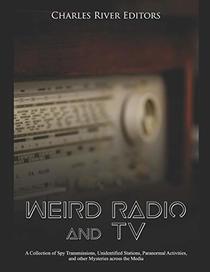This book first talks about the unusual and quirky events in America (mostly) that came about with the new mediums of radio and then television. After World War I, broadcasters set up novelty stations on such strange things as ships at sea, traveling trains, cars, and trucks. But by the late 1930s, governments got involved, licenses became necessary, and stations became standardized.
One of the most famous radio shows occurred for Halloween in 1938, with Orson Welles reading 'THE WAR OF THE WORLDS' by HG Wells. It caused some panic across America because of the realistic broadcast.
Probably one of the most shocking radio programs was from a Canadian-American Catholic Priest, Fr. Charles Coughlin. He started with religious themes in 1931, but moved on to political diatribes and then anti-Jewish rhetoric by 1939. His rants eventually caused radio station broadcasters to establish a code of conduct for radio stations.
During World War II, every country used the radio as a method of demoralizing and misleading the enemy. (Brit-turned-German) William Joyce became Lord Haw-Haw, sending messages mocking the British war effort. He was killed for treason after the war. Tokyo Rose is a fascinating story; don't miss it.
Lest you believe that espionage on the radio airwaves is long-gone, there's a very interesting chapter about it (citing some evidence as recently as 2016). Pirate radio was new to me; broadcasters send their signal from international waters (usually on ships) for fun, profit or politics. The most interesting pirate radio station was beamed into Palestinian and Israeli homes, espousing peace (from 1973 to 1993).
Obviously, the person who wrote this is very knowledgable about this whole world of transmissions and it shows in his descriptions. He lightly touches on UFOs but spends more time on 'voices from beyond' captured by the radio receiver or even TV transmissions. Some of these ghostly images on TV are not easy to explain. The author gets up and runs with this topic.
Overall, this is an enlightening topic that I never would have read (under normal circumstances). I got it as a freebie and was intrigued by the title. I'm glad I read this very different Charles Rivers's title.
One of the most famous radio shows occurred for Halloween in 1938, with Orson Welles reading 'THE WAR OF THE WORLDS' by HG Wells. It caused some panic across America because of the realistic broadcast.
Probably one of the most shocking radio programs was from a Canadian-American Catholic Priest, Fr. Charles Coughlin. He started with religious themes in 1931, but moved on to political diatribes and then anti-Jewish rhetoric by 1939. His rants eventually caused radio station broadcasters to establish a code of conduct for radio stations.
During World War II, every country used the radio as a method of demoralizing and misleading the enemy. (Brit-turned-German) William Joyce became Lord Haw-Haw, sending messages mocking the British war effort. He was killed for treason after the war. Tokyo Rose is a fascinating story; don't miss it.
Lest you believe that espionage on the radio airwaves is long-gone, there's a very interesting chapter about it (citing some evidence as recently as 2016). Pirate radio was new to me; broadcasters send their signal from international waters (usually on ships) for fun, profit or politics. The most interesting pirate radio station was beamed into Palestinian and Israeli homes, espousing peace (from 1973 to 1993).
Obviously, the person who wrote this is very knowledgable about this whole world of transmissions and it shows in his descriptions. He lightly touches on UFOs but spends more time on 'voices from beyond' captured by the radio receiver or even TV transmissions. Some of these ghostly images on TV are not easy to explain. The author gets up and runs with this topic.
Overall, this is an enlightening topic that I never would have read (under normal circumstances). I got it as a freebie and was intrigued by the title. I'm glad I read this very different Charles Rivers's title.




